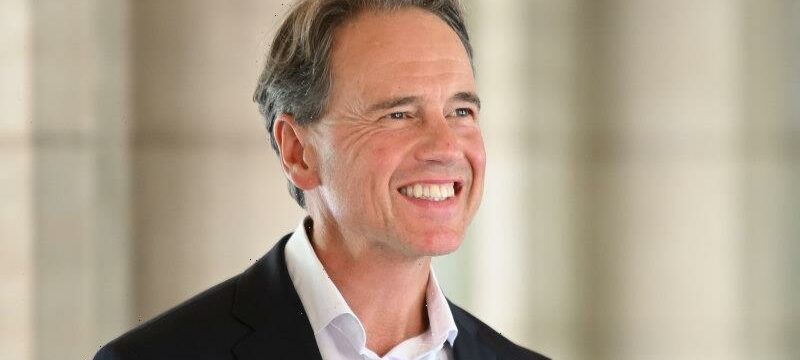Pandemic-era health minister Greg Hunt is urging a national rethink on COVID-19’s threat level, calling for a new vaccine push heading into winter and renewed focus on the volume of people dying from the disease.
In his first interview since the Morrison government’s defeat, the now-retired MP – who is beginning a new job with the University of Melbourne – also propounded the need for the Liberal Party to attract multicultural and female candidates and declared history would judge the Coalition’s pandemic response positively.
Greg Hunt at the University of Melbourne on Friday.Credit:Eddie Jim
Hunt dismissed criticism about the vaccine rollout, which was pilloried by commentators and some state premiers and noted the uptake of boosters was slow, and said clear, ongoing public messaging on vaccines was crucial.
Without directly criticising the Albanese government elected in May, he said aged care deaths had risen dramatically since vaccination allowed governments across the world to drop onerous restrictions.
“Sadly there’s been a doubling of deaths from COVID in aged care in the last 9 months (2500) compared with the previous 28 months (917), but with very little public awareness or commentary either within the media or government. That says there is a risk of losing focus,” Hunt told this masthead, noting the overall death rate outside aged care has also risen.
“I hope we can have a renewed focus on vaccination … as we approach winter, now might be a very timely moment to step up the vaccination campaign,” he said.
About 34 per cent of the eligible population has had four vaccine doses and 35.9 per cent has had three. The rest have had two or fewer. The government last week announced fifth shots will be available from February 20.
In his new role as Honorary Melbourne Enterprise Professor, Hunt will work across university faculties and chair the medical school’s innovation and enterprise board. He joins prominent banker John Wylie – through his billion-dollar Tanarra Capital fund – and former Victorian premier John Brumby – through the state government-run Breakthrough Victoria – in partnering with the university to turn research into high-value goods and services.
Hunt will help steer a 10-year plan to create an environment in which cutting-edge medical research is turned into products whose development attracts the smartest minds to Melbourne along with vast capital investment, unlocking jobs and productivity.
“I always said as [health] minister, Melbourne was one of the three greatest medical research precincts along with Boston and Cambridge,” he said. “We are world-leading with them in research and treatment. We are also very good at innovation, but we have the capacity to join them as world-leading.”
”The prospects for Melbourne are almost unlimited as a city … It creates jobs and wealth and enormous health and career outcomes for Australians.”
Hunt pointed to recent investments by CSL and Moderna as positive signs of future growth. But he said faster clinical trial approvals, improved talent acquisition, and better linkage between researchers and the private sector could spur huge uplift and would mean new drugs, treatments and medical devices would be produced in Melbourne.
As the Liberal Party prepares for a byelection in Melbourne’s outer-eastern suburban seat of Aston, Hunt said the party should pick a woman with “deep community links” to the electorate, which takes in suburbs like Rowville and Knox. While declining to endorse a particular candidate, only three prospective candidates – oncologist Ranjana Srivastava, healthcare leader Amy Bach, and former Victorian MP Cathrine Burnett-Wake – have some degree of association with Aston.
Hunt, who represented the Mornington Peninsula-based seat of Flinders for two decades, contended the Liberals needed to emulate the British conservatives, who elected a woman, Liz Truss, and a person of Indian background, Rishi Sunak, as their most recent prime ministers.
“This is a very important evolution for the Liberal Party,” he said. “The work is being done, people heard the message of the electorate at both the state and federal levels in Victoria and they’re responding.”
In a full-throated defence of the Coalition’s management of COVID-19, Hunt said: “I think the period of government we’ve just been through, as history evolves in terms of what we did with the economy and health and safety, is likely to be increasingly appreciated”.
“Australia’s response, and I still get this from people around the world, was clearly one of the most effective of any country for 2020 and 2021. We had one of the lowest death rates in the world, one of the highest vaccination rates at 98 per cent, and at the same time one of the lowest unemployment rates.”
Australia’s vaccine rollout was one of the greatest national achievements in decades, he claimed, saying the government learnt lessons each day and expressed no regrets about the procurement of vaccine.
“We secured all the possible vaccines at the earliest possible time,” he said, adding the government beat its initial target for full first-dose vaccination coverage by more than a month.
“Donald Trump was not selling vaccines to Australia. The priority for the US vaccine makers had to be for the US because we had incredibly low rates and they and catastrophic scenes.”
A federal government-commissioned review found “Australia’s procurement activities were consistent with other high-income countries.”
Cut through the noise of federal politics with news, views and expert analysis from Jacqueline Maley. Subscribers can sign up to our weekly Inside Politics newsletter here.
Most Viewed in Politics
From our partners
Source: Read Full Article

